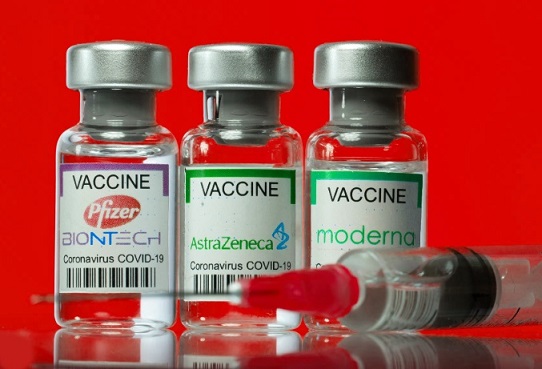New Study Shows How COVID-19 Vaccines Affect Immune Responses in Individuals with Diabetes
Nikhil Prasad Fact checked by:Thailand Medical News Team Feb 12, 2025 2 months, 3 days, 10 hours, 47 minutes ago
Medical News: Scientists have long been concerned about how well people with diabetes respond to vaccines. A new study by researchers from the University of Oxford-UK, the Medical University of Graz-Austria, and the University of Bayreuth, Bayreuth-Germany, explores how individuals with Type 1 and Type 2 diabetes respond to COVID-19 vaccines. Their findings reveal differences in immune system reactions between people with and without diabetes.
 New Study Shows How COVID-19 Vaccines Affect Immune Responses in Individuals with Diabetes
New Study Shows How COVID-19 Vaccines Affect Immune Responses in Individuals with Diabetes
This
Medical News report delves into how the immune response of vaccinated individuals with diabetes differs from those without the condition. The research team conducted a detailed analysis of immune cells in people with diabetes after they received COVID-19 vaccines. Their results provide important insights into vaccine effectiveness and how well immune memory is maintained over time.
The Focus of the Study
The study examined immune responses in individuals with Type 1 and Type 2 diabetes following full vaccination against COVID-19. Researchers analyzed blood samples from participants who received different types of vaccines, including Pfizer-BioNTech (BNT162b2), AstraZeneca (ChAdOx1-S), and Moderna (mRNA-1273). These samples were compared to those of individuals without diabetes to assess differences in immune system activation and memory.
The research focused on T cells, which play a critical role in protecting the body against viruses. Specifically, scientists examined vaccine-specific CD4+ and CD8+ T cells, which are responsible for immune memory and response. These cells are essential for fighting infections, including COVID-19, as they help the immune system recognize and attack viruses more effectively after vaccination.
Key Findings of the Study
The study found several key differences in the immune responses of individuals with diabetes compared to those without the condition:
-Weaker Immune Memory in Type 1 Diabetes - Individuals with Type 1 diabetes had a reduced ability to maintain memory T cells after vaccination. This means their immune system was less able to recall the virus and mount a strong defense upon reinfection or exposure.
-Impaired T Cell Activation in Diabetes - Vaccine-specific T cell responses were significantly weaker in individuals with Type 1 and Type 2 diabetes. While their immune system initially responded to the vaccine, the durability of this response declined over time.
-Higher IL-10 Production in Diabetes Groups - One of the surprising findings was the increased production of IL-10, a cytokine linked to anti-inflammatory effects, by CD8+ T cells in people with diabetes. While IL-10 can help regulate immune responses, excessive amounts may dampen the immune system’s ability to fight off future infections.
-Lower Recall Responses After Booster Doses
gt;
- When participants received a booster dose, many individuals with diabetes showed a weaker response compared to those without diabetes. This suggests that additional booster doses may not work as effectively in diabetes patients.
-Differences in Vaccine-Specific Cytokine Production - Individuals with diabetes had altered cytokine profiles, with increased levels of IL-13, a cytokine linked to an anti-inflammatory response. This suggests that their immune system might favor a more tolerant state rather than a robust attack against the virus.
Implications for Individuals with Diabetes
These findings highlight the challenges that individuals with diabetes may face when trying to build a strong immune defense against COVID-19. The reduced effectiveness of vaccine-induced immune memory suggests that people with diabetes might be more vulnerable to reinfection. Moreover, the increased production of IL-10 could mean their immune system is less aggressive in responding to future threats.
The study also raises concerns about the need for tailored vaccination strategies for people with diabetes. Additional booster doses or alternative vaccine formulations may be necessary to enhance their protection. The findings suggest that monitoring immune responses in diabetes patients after vaccination could be crucial in ensuring adequate long-term immunity.
Future Research and Recommendations
The researchers emphasize the need for further studies to explore why immune memory is weaker in diabetes patients and how vaccine strategies can be improved for them. Future research should focus on:
-Investigating how different vaccine types influence immune responses in diabetes
-Exploring ways to strengthen immune memory in diabetes patients
-Studying the long-term effects of booster doses in people with metabolic disorders
Doctors and healthcare providers may need to consider additional precautions for individuals with diabetes, such as more frequent booster shots or combination vaccines that enhance immune responses.
Conclusion
The study provides crucial insights into how people with diabetes respond to COVID-19 vaccines. It shows that their immune response is weaker, their ability to maintain long-term protection is compromised, and their cytokine profile suggests a more regulated rather than aggressive immune reaction. This could mean that diabetes patients remain at higher risk of severe COVID-19 despite being vaccinated.
With these findings, scientists and healthcare professionals can work toward developing better vaccine strategies that specifically address the immune challenges faced by individuals with diabetes. Ensuring adequate protection for this group will be essential in managing the ongoing pandemic and preparing for future infectious disease threats.
The study findings were published on a preprint server and are currently being peer reviewed.
https://www.biorxiv.org/content/10.1101/2025.02.08.637262v1
For the latest on the COVID-19 Vaccines, keep on logging to Thailand
Medical News.
Read Also:
https://www.thailandmedical.news/news/italian-and-swiss-researchers-warn-that-covid-19-mrna-vaccines-can-lead-to-arrhythmias
https://www.thailandmedical.news/news/breaking-covid-19-news-thailand-study-finds-that-homologous-vaccination-with-pfizer-s-bnt162b2-increases-risk-of-myocarditis-and-pericarditis
https://www.thailandmedical.news/news/breaking-medical-news-italian-study-shows-that-covid-19-vaccines-causes-persistent-cd16-downmodulation-and-nk-cell-impairment
https://www.thailandmedical.news/articles/vaccine-news
